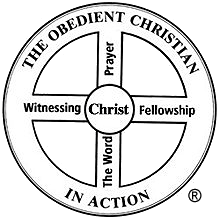
Have you ever had the experience while counseling where you’ve shown your counselees how the Scriptures apply to their everyday life week after week, but then they look in at you in frustration and essentially say, “What’s the secret? What are you not telling me? Why isn’t this working?”
Or perhaps you’ve had that in your own personal, spiritual walk. You’ve studied the Scriptures to help you in a certain area, but you find yourself after a while thinking, “What am I missing? What’s the secret?”
Generally, counselees don’t ask the question as blunt as that and neither do we. Counselees might say something like, “I’m not ready to be done counseling.” And in our personal lives we may think, “Maybe I’m not able to change in this area.”
What I noticed recently from a couple I was counseling was that they could see how the truth of Scripture applied and how it could change everything for their marriage. They believed it wholeheartedly! But the problem was, they were still thinking and acting according to their old, fleshly ways that had led them to counseling in the first place. As a result, they were looking at me wondering what secret ingredient I was withholding to help them change.
The Secret Ingredient
Here’s the secret—there is no secret! There is no magic formula or pill that you take that all of a sudden makes you apply all of the truth of Scripture that you know (feel encouraged??). The closest thing to a secret ingredient that will magically help you change would be the gospel of Jesus Christ. The gospel literally raises us from the dead and gives us new life in Christ immediately (cf. Eph. 2:1-5)! BUT that doesn’t mean that now that we are alive in Christ growing and changing is easy. Quite the contrary! Growth is difficult, but the good news is that it is possible through—and only through—the power of the Holy Spirit in us and his Word.
Consider what God calls all Christians to do once they believe the gospel and are saved. God calls all Christians to live in a manner worthy of the calling of Jesus (cf. Eph. 4:1). The problem is none of us are worthy of that call when we receive it. We are called then, to live and become what we are not by nature. We are called to become like Jesus. That is difficult!
How then should we respond to counselees who are looking for the secret? How should we counsel ourselves when we are thinking there is a secret that we’re missing? The problem in these instances often isn’t lack of knowledge.
“We all have uphill hopes, but downhill habits.”
Often times the problem is, “We all have uphill hopes, but downhill habits.”[1] The uphill hopes of counselees and ourselves is living in a way that is pleasing to Christ. We don’t want to respond in anger towards our spouse, rather we want to respond patiently and graciously. We don’t want to worry about our circumstances, rather we want to trust fully in our loving, sovereign Lord.
The problem is we have downhill habits that prevent us from reaching our uphill hopes. And one of those downhill habits is often the culprit of a lack of growth. I think Dawson Trotman’s “Wheel” can help unpack this[2]:
The illustration is simple. The life a Christian is represented by the outside ring (the wheel). The power that is needed to propel the wheel forward comes from the hub, which is the center where the axle is. The hub is Jesus Christ—apart from Christ we can do nothing (John 14:5). The key—or as we’ve called it, the secret—is connecting our life (the wheel) to the power of Jesus Christ (the hub). The way we do that is through the spokes. Apart from the spokes that attach a wheel to the hub, the wheel will never receive power and can do nothing. The spokes are the key Christian disciplines.
As counselors, we emphasize and assign daily prayer and Scripture reading/memorization. But what I’ve noticed in my own counseling is that sometimes I can overlook these important spokes—I miss the downhill habit of counselees continuing to live undisciplined in the area of their personal spiritual walk. I think sometimes I miss this because I think far too much of myself as a counselor. I believe that my exegesis and exposition is going to be the magic pill that transforms their life forever. When in reality only God has the ability to change them. He does change people through his Word and its clear explanation, but what I need to remember is that I’m not the hub. Jesus Christ is the hub and as a counselor I need to make sure that my counselees are connecting their life to the power of Jesus Christ.
Conclusion
What then is the secret to change? It’s the basics. It’s the fundamentals that just cannot be ignored. Every day we and our counselees need to be connected to the life-giving and changing power of Jesus Christ. We need to form the uphill habits of reading God’s Word and hiding it in our heart (cf. Psalm 119:11), and prayer. Apart from these simple daily spiritual disciplines, we’ll be trying to become like Christ without the necessary power to do so. Change will be dishearteningly elusive.
Let’s commit together that in our counseling and our personal walk with Christ, that we won’t usurp the primary place of Jesus by making ourselves the hub. Let’s commit to daily spoke maintenance so that our wheels (i.e. our lives and our counselees’ lives) will work every day to become more like Christ for God’s glory.
[1] Credit to John Maxwell GLS speaker August 12, 2016.
[2] Betty Lee Skinner, Daws: The Story of Dawson Trotman, Founder of the Navigators (Grand Rapids, MI: Zondervan, 1974), 80.
 Biblical Counseling
Biblical Counseling 